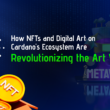How many digital books do you have on your phone, reader, etc? I didn’t ask how many digital books you own because you don’t own them. You have a digital copy that you can’t transfer or resell. To date, we have all resigned ourselves that this is the way of things. That is about to change.
You will hear me say often that anything is possible in Cardano. It’s a wide-open space that allows for freedom of expression and creation in a way that is unheard of in the fiat world. There is room to challenge the usual way of doing business. Book Token is here to change the world of digital publishing. They intend to create a space that focuses on people as well as profits, and encourage ownership instead of one-way rentals.

Let’s step back into history for just a moment. Since the beginning of the written word, various organizations have gained power by controlling information. The early Christian church, for example, benefitted from having literate priests that could interpret scripture for the mostly illiterate commoners. Until the 19th Century it’s safe to say the majority of people could not read. The publishing industry, prior to Amazon, operated in a very antiquated and inefficient way that evolved out of this methodology. The digital publishing revolution, which Amazon spearheaded 15 years ago, took full advantage of these inefficiencies to create a centralized, unassailable publishing behemoth that keeps us all under its thumb.
Amazon has worked very hard to maintain and grow its monopoly. At this time there are four large book publishers who are prevented from working together or challenging Amazon’s choke hold by various legal considerations. Amazon holds all the sales data and communicates the bare minimum back to the publishers, effectively cutting off interaction with the writer and their audience. Because it is convenient, the monopoly continues to grow. They control what you read. It’s pretty grim actually, but Book Token offers a different vision.

The good news is that technology has finally evolved to the point that allows for a viable solution. Blockchain technology allows any digital item to be unique and trackable. This changes everything. Book Token intends to build on Cardano and revolutionize publishing. They chose Cardano because of its low fees and open-source nature. The project team states in the whitepaper that they previously created and sold a device agnostic eBook platform that had over 6,000,000 registered users and worked with large publishing houses. This would give them a unique insight and experience in constructing an upstart platform that intends to revolutionize the industry.

Here is a visualization of their ecosystem, taken from their whitepaper:
Book Token will have a native token that intends to have real functionality. The token will be used to reward readers, pay transfer fees and book royalties, and allow content creators to connect with their audience. Additionally the tokens can be used to purchase books, however the platform will accept fiat currency as well. Here is breakdown of the proposed tokenomics from their whitepaper:
The total fixed supply of all $BOOK is 10B tokens:
• 3B (30%) for Reader Rewards
• 2.5B (25%) for Fundraising
• 3B (30%) for Team & Advisors
• 1.5B (15%) Reserved for Future Platform Development
Some of the benefits of Book Token:
- Readers will be able to see the real time digital value of the books they own
- Readers will be able to resell their books
- Digital books can be shared or transferred like physical books
- Publishers and authors will be paid via smart contracts for primary and secondary sales
- Enhanced protection from counterfeiting
- Better data for authors and publishing houses
- Unique digital collections
- Students can transfer digital books
Initially it appeared that the digital revolution was going to help writers. Instead the exact opposite has occurred. Book advances and royalties have steadily decreased even as production costs have gone down. Book Token intends to put the control back in the hands of content creators. Since each digital book is a unique item, authors will be able to determine the quantity of books that are made and when / where they are sold. Blockchain technology will help publishers prevent counterfeiting and provide accurate, easily accessible data. Readers will actually own a copy that is unique, retains value and can be resold.
For blockchain to achieve mass adoption, several things have to happen. The most important, perhaps, is that it has to be easier to use. It might operate as a back end without users even understanding what is powering their applications. We dont generally think about how the internet works, right? One of the things that I find most exciting about Book Token is that it intends to create a bridge to the non-crypto world. It will accept fiat as well as Cardano native Book Token. The intent is that it will appeal to all users, crypto or fiat, because of its inherent benefits – an impressive vision at this point in Cardano’s development.
The second thing that I personally like about Book Token is that it intends to decentralize the publishing industry. This will create more revenue for content creators and allow for a better flow of information without centralized gatekeepers like Amazon. I really don’t like big tech controlling where and when information is accessed.
Like many projects, Book Token is early in their journey and success is not guaranteed. I hope they succeed, though. Their mission aligns nicely with Cardano’s philosophy of challenging the established order and pushing power to the edges. I definitely plan to keep an eye on this one. If you are interested in learning more you can find them on Twitter, on their website or check out this great interview by Pete with Learn Cardano:










